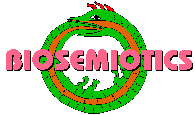Gatherings in
Biosemiotics 2
Tartu, Estonia - June 14-17, 2002
PROGRAM
Abstracts
Few photos
A selection of papers from the 1st Gatherings is
published.
Gatherings in Biosemiotics provide a regular
framework for discussions of
biosemiotics
in the context of
biology.
Gatherings in Biosemiotics are international annual meetings for
scholarly exchange of ideas and views in semiotic biology. Denmark and
Estonia alternate as hosts for these meetings. The conference language
is English. This is the second
meeting.
Background:
During the 1990s, biosemiotics grew from being an idea inside the
heads of a few (semioticians, theoretical biologists, ethologists ..)
to becoming a more widely recognized perspective for the study of the
"signs of life" as well as the "life of
signs". Due to its unifying vision biosemiotics has obvious
implications for a diversity of separate fields inside physics,
biology, medicine, psychology, anthropology, semiotics, and philosophy
as well as cross-disciplinary research programs such as cognitive
science, artificial life or autonomous agents. Biosemiotic analysis
may also offer interesting new ways of evaluating biological
technology. On the other hand, biosemiotics may be seen as a
fundamental new approach to theoretical biology.
Biosemiotics has been on the agenda of many
international meetings, and the 1990s also saw a couple of
publications devoted to biosemiotics proper. Until
the
Gatherings however
biosemiotics has not yet been the prime focus for any regular
international activity.
We will have sessions touching on major themes of biological theory.
We try to do it independently of funding and thus we have no
invited speakers. For the First Gatherings, we have received over 30 paper
proposals from the specialists of Austria, Brazil, Canada,
Czechia, Denmark, Estonia, Finland, France, Germany,
Italy, Norway, Russia, Sweden, Taiwan, Turkey, USA. Thus, we predict that
many of world leading biosemioticians will attend the 2nd meeting.
Organizers:
Department of Semiotics, University of Tartu
Jakob von Uexküll Centre
Tallinn Zoo
June 13-14
Arrival to Tartu.
June 14-16
Sessions on major themes of semiotic biology, starting at noon of June 14.
June 17
A bus-trip to Puhtu (the place where
Jakob von Uexküll lived in 1930s, at the coast of Baltic Sea), with a seminar in forest.
From Puhtu, the
bus will take participants to Tallinn. In the evening of June 17, we
will have a zoosemiotic session in Tallinn Zoo.
June 18
Departure from Tallinn.
Location:
The meeting will take place in the University of Tartu, Tartu, Estonia. Flying to Tallinn, one
should take bus (2 hours) to Tartu. Sessions will be held from the noon of June 14 to
the evening of June 16.
The last day (June 17) will include a bus-trip
Tartu-Puhtu-Tallinn (with a seminar in Puhtu), and a night session in
Tallinn Zoo. Departure from Tallinn on June 18.
Registration & information:
For registration, please send a letter to
Kaie Kotov (secretary
of the meeting). Please add also your affiliation and
your postal address.
Our address:
E-mail: kotov@ut.ee
Fax: +372-7-375933
Postal address:
Department of Semiotics, University of Tartu, Tiigi Str. 78, 50410
Tartu, Estonia
Hotel should be booked in advance - see
information on
hotel reservation.
The registration fee is 500 EEK [about 30 USD] (may be paid
at the place; includes
conference materials, coffee
and bus trip; dinner is on your own).
Time Table:
Title of the talk (together with a brief abstract) should be delivered (e-mailed) to
Kaie Kotov, at
kotov@ut.ee.
Publication:
The selected papers from the First Gatherings in Biosemiotics have been
published in
Sign Systems Studies, vol.
30(1), 2002. The papers
from the Second Gatherings will also be published
in a top-level international journal.
A
photo from the first meeting,
Gatherings in
Biosemiotics 1, Copenhagen May 24 - 27, 2001.
- few organisers, and speakers
Kalevi Kull,
University of Tartu
Jesper Hoffmeyer,
Institute of Molecular Biology, University of Copenhagen
Claus Emmeche,
CPNSS, Niels Bohr Institute, University of Copenhagen
